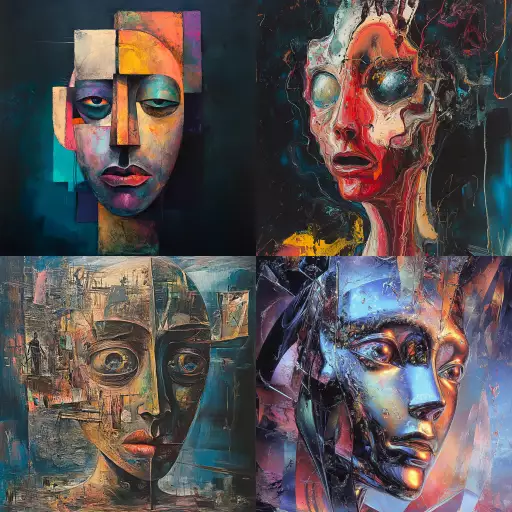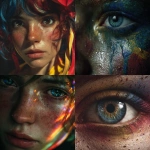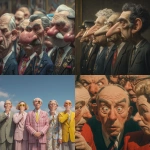Explore the Best AI Image Gallery

Imagining Tomorrow: AI Image Generation and the Marketing Revolution
The world of marketing is undergoing a seismic shift, driven by the emergence of powerful artificial intelligence (AI) tools capable of generating stunningly realistic images. This technology, known as AI image generation, is poised to revolutionize how brands communicate with their audiences, offering unprecedented creative possibilities and efficiency gains.
A Creative Canvas for Marketers
For marketers, AI image generation presents a game-changer. Gone are the days of relying solely on expensive photographers or graphic designers to produce compelling visuals. Now, with just a few prompts describing the desired image, sophisticated algorithms can generate unique and captivating content tailored to specific marketing campaigns.
- Product Visualization: Showcase products in realistic settings and diverse scenarios, allowing customers to visualize their purchase before committing.
- Social Media Content: Create eye-catching visuals for social media platforms, boosting engagement and reach with dynamic, shareable content.
- Personalized Marketing: Generate customized images based on customer preferences and demographics, delivering a more personalized and engaging brand experience.
Beyond Static Images: The Dynamic Potential of AI
The capabilities of AI image generation extend beyond static visuals. Emerging technologies allow for the creation of dynamic and interactive content, further blurring the lines between reality and imagination:
- Animated Content: Bring products and brand stories to life with captivating animations generated directly from text prompts.
- Generative Video: Produce short video clips showcasing product demonstrations or marketing messages, enhancing storytelling and viewer engagement.
- Augmented Reality Experiences: Integrate AI-generated images into AR applications, creating immersive and interactive experiences for customers.
Navigating the Ethical Landscape
While the potential benefits of AI image generation are undeniable, it is crucial to approach this technology responsibly. Several ethical considerations must be addressed:
- Copyright and Intellectual Property: Determining ownership and copyright for AI-generated images remains a complex issue requiring careful consideration.
- Bias and Representation: AI algorithms can perpetuate existing societal biases if not trained on diverse and representative datasets, leading to potentially harmful representations in generated images.
- Transparency and Accountability: It is essential to ensure transparency in how AI image generation tools work and establish clear lines of accountability for the outputs they produce.
The Future of Visual Content
AI image generation is still in its early stages, but its impact on marketing is undeniable. As technology continues to evolve, we can expect even more sophisticated and creative applications:
- Personalized Branding: Generate unique brand assets tailored to individual customer preferences, fostering deeper connections.
- Data-Driven Creativity: Leverage AI to analyze consumer data and generate images that resonate with specific target audiences.
- Hyper-Realistic Experiences: Create immersive and indistinguishable virtual worlds powered by AI-generated imagery, blurring the lines between reality and simulation.
The future of visual content is undoubtedly intertwined with AI. By embracing this transformative technology responsibly and ethically, marketers can unlock new possibilities for creativity, engagement, and innovation, shaping a visually captivating future for brands and consumers alike.
](https://images.ai-img.art/thumbnails/150/2055d76bd9940ffa62a06896525d0f07a5b57bbe3b766a043d977b1c678d69c1.webp)










](https://images.ai-img.art/thumbnails/150/546184a0cbf4b3d07f6ce10e72c0faf2a088fd4aac33c10422c11d76bf734be8.webp)
](https://images.ai-img.art/thumbnails/150/7c569b0eb6e7eddaf8d96b3e3532d8b0de6a7d79916c0ef333632070a3085997.webp)


](https://images.ai-img.art/thumbnails/150/912c326dfe63108e4ca5cdcf408c2247b3e7d4afacde8aac324b06a9a4a6913c.webp)



](https://images.ai-img.art/thumbnails/150/fe2cfa6e64066976325cd677ef63e43820c1843dc81bcf90c0b68dc300689e03.webp)





](https://images.ai-img.art/thumbnails/150/e3a2739669e7e25395e2cc5578f479057e60973d76d85724a5758b6e1039ee3c.webp)








](https://images.ai-img.art/thumbnails/150/76d26b409b1a7acfd86a78c5d5047ff9bd7be9ecf55ce838cc2c854bf42c00be.webp)


](https://images.ai-img.art/thumbnails/150/5d3ed451a35bec12705494605ebbe909dc0f4319e9a6064ab824b39609ada54e.webp)





](https://images.ai-img.art/thumbnails/150/c064d275c74e06a80b37064ffe83a30913361f0a4602f9a669e8ecbdb37ec6ad.webp)

](https://images.ai-img.art/thumbnails/150/f401da92914cabe9929e88ee4a02fbe744702d0c12dcbbd71efa8cf4cf1a6fee.webp)
](https://images.ai-img.art/thumbnails/150/229d202f0ba192ad857509389a22aa5e3b948a813ee711996ae9d32631b486e0.webp)


](https://images.ai-img.art/thumbnails/150/8561b450506900783584c556bf57ccab16188eb111ae0b9ec0cc34841b9a6825.webp)